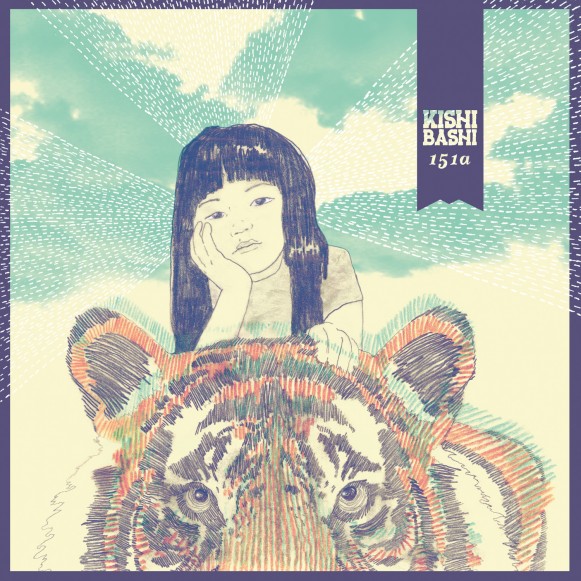Because I was late on the uptake, I’m going to call Kishi Bashi’s 151a the 2012 album that I’ll be playing well into 2013. This album was suggested to me by a coworker and enthusiastically mentioned by friends in wildly different circles within the span of one week. And because I love synchronicity, I took it as a sign that this album would be important to me, to my friends in cities and countries across the world, and to the collective “us”—the ones who seek out music that brings us to new places. All of us, it turns out, were looking for 151a.

Courtesy of Kishi Bashi.
This album is Kishi Bashi’s first full-length solo album (when they say multi-instrumentalist, they really mean it), following his EP, Room for a Dream. Kishi Bashi is also the singer in Jupiter One, a New York based synth/psych/rock band whose self-titled debut album I used to shamelessly belt out in my car in the summers of high school. I had completely forgotten about Jupiter One when I first listened to 151a for the first time. Upon realizing the connection, I added another strange synchronicity to the list; I was a believer.
There is a dreamy and downright ecstatic energy that carries from from the self-titled album Jupiter One, into 151a, yet Kishi Bashi has achieved something more in 151a. He creates the feeling of a full, complete, and multidimensional world that wasn’t present in his previous work. He takes the listener beyond track numbers and catchy hooks, and within merely nine tracks, lifts the listener up to transcend into a new world and experience an entire story.
The first track, “Intro/Pathos, Pathos” is a journey away. Amidst swirling sounds of voices and violins comes structure—the beat of a tambourine, the steady rhythm guitar, and voices rising higher and higher. The Japanese “aetara dousuru” which repeats during the song translates as “what would happen if we could meet?” It’s a song about possibility that becomes reality during the rest of the album. It is the moment where the listener learns that the story they’re embarking on is a love story. In “Manchester” we arrive. It’s a song about falling in love, the kind of love that makes us want to see the world through fresh eyes.

Courtesy of The Washington Post.
And of course, like every great romantic movie, there’s the montage where everything is going perfectly. It’s the scene in Annie Hall where Woody Allen and Diane Keaton don’t know how to cook lobster to save their lives, but they’re laughing. For me, that moment is “Bright Whites.” This song reminds me of the invincibility that comes from a coffee high after an all-nighter, a drunken night with friends, a first kiss—that moment when you feel like anything is possible, even though you know from previous experience that a fall always follows.
The synth claps that begin in “Bright Whites” carry over into “All Began With a Burst,” but then the pace of the album slows down for “Wonder woman, Wonder Me.” The violin plucking in this song sound like little raindrops, the long, legato lyrics coming like rivulets that flow into streams and rivers. It is the total versatility of Kishi Bashi as a vocalist and instrumentalist to create entirely different soundscapes that make this album so impressive to experience.
His infusion of pop/synth sounds, impressive violin techniques, and vocals that range from rhythmic to smooth and slow-moving, allow this album to escape sounding rote, or one-dimensional. In both “Atticus, In the Desert” and “Beat the Bright Out of Me,” Kishi Bashi uses rhythm guitar to create a very earthen sound, with layered folk harmonies that feel more raw than other parts of the album. “I Am the Antichrist to You” again uses the more romantic, sparse, vocals-focused approach to evoke the sadness that comes with endings and feels almost suspended in midair; it is an acceptance of loss. But, the sentimentalizing of relationships gone past doesn’t last for too long, as “Beat the Bright Out of Me” is the return to humanity. It is the fall back to the earth, the rediscovery of oneself.
Throughout the 30 minutes of this album, we follow the hero through his call to action to his denouement—it’s an album that doesn’t waste one second. Although part of me wishes 151a was longer, the rest of me feels that the length of the album embodies the quick-natured way in which people fall for each other. It’s over before it began. Just as a dream feels like an epic but happens in the blink of an eye, Kishi Bashi’s 151a returns us back to earth unscathed, but not unchanged.
Written by Catherine LeClair.
Catherine LeClair is a Maine native who is still confused by suburbs but can now successfully hail her own cab. She didn’t wander too far down the coast; after recently graduating from Boston College with a degree in English, she now lives and works in Boston. In her free time, Catherine enjoys going to local shows, finding great nacho joints, and scoping out cute dogs on the street. Please do not try and call her Cathy.

